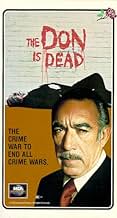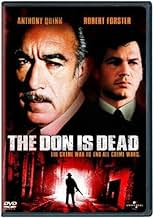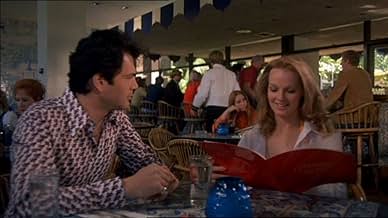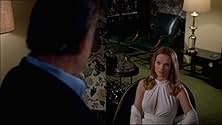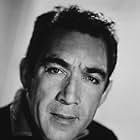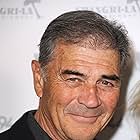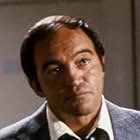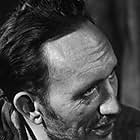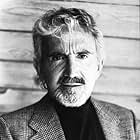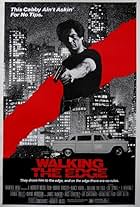IMDb RATING
6.2/10
1.5K
YOUR RATING
After his mistress is savagely beaten up a Mafia leader goes after the killer with a bloody vengeance. Soon after the hunt begins, a gang war ensues.After his mistress is savagely beaten up a Mafia leader goes after the killer with a bloody vengeance. Soon after the hunt begins, a gang war ensues.After his mistress is savagely beaten up a Mafia leader goes after the killer with a bloody vengeance. Soon after the hunt begins, a gang war ensues.
Barry Russo
- Don Aggimio Bernardo
- (as J. Duke Russo)
Frank DeKova
- Giunta
- (as Frank de Kova)
Storyline
Did you know
- TriviaActors Abe Vigoda and Al Lettieri had recently appeared in Francis Ford Coppola's The Godfather (1972).
- ConnectionsReferenced in Romeo Is Bleeding (1993)
Featured review
"The Don Is Dead" is clearly an attempt to cash in on the success of "The Godfather" which was made the previous year. Very few people regard "The Don Is Dead" as a great movie, but many admire "The Godfather" enormously. (There are also many who do not, particularly fans of gangster films in general. Their attitude was brilliantly summarised by Ian Cameron in his book "The Gangster Film" where he described "The Godfather" as "built to be the "Gone With The Wind" of the crime genre, which is to say a crime movie for people who despise crime movies but are impressed by gigantic, best selling novels, a movie for people who do not even much like movies.")
"The Don Is Dead" borrows from "The Godfather" the central theme of a younger, less forceful, less impressive brother maturing during a crisis and developing both leadership qualities and murderous ruthlessness. It also borrows the carefully explained structure of the crime family with its leader (the Don) and its adviser. Fortunately, "The Don Is Dead" takes nothing else from "The Godfather". It does not aspire to be a "Gone With The Wind" of gangster movies. It is content to be an enjoyable, fast-moving well-made crime film. "The Don Is Dead" was made by a team of top Hollywood professionals, and their expertise is evident throughout.
In a city dominated by three crime families, the adviser of one hatches a scheme to grab control of the city by setting the other crime families against each other. For a time his plan works well, and gang warfare breaks out. One of the family heads is dependant on two brothers who kill for him. The younger of these brothers is reluctant to participate but is more intelligent than both his brother and his friend, the crime Don. Gradually, as the violence accelerates, the younger brother assumes command.
The pacing of "The Don Is Dead" is excellent. Each scene is tightly cut but nothing is rushed. Whether an action scene or a whispered conversation, everything is given as much time as necessary but nothing more. The shootings and bombings - of which there are many - are done properly: in other words quickly but credibly. Neither John Woo-style ludicrously fast cutting nor Sam Packinpah-type slow motion diminish "The Don Is Dead".
With one exception, the acting is good throughout. It was enjoyable to see Anthony Quinn in a modern role and wearing smart city clothes. Quinn, of course, has enormous power on screen, but so too have some of the actors in supporting roles. The exception is Frederic Forrest who has neither the acting skill nor the screen charisma adequately to flesh out the main role of the younger brother. He is further hampered by his whining voice. Throughout he gives the impression of being weak and petulant. A key scene is when he returns to his base which has been bombed in his absence and learns that his brother has been killed. His men are about to quit. After a moment or two of private grief, he shouts at his men that they will strike back, and restores their self-confidence and determination. Actors like Charlton Heston and George C. Scott could have worked miracles with that material, but Frederic Forrest just stands there and whines. It is difficult to imagine any hardened criminal regarding him as a leader.
The cinematography is excellent, and Richard H. Kline deserves congratulation for creating in a colour movie the chiaroscuros traditionally found in black and white crime films of the 1940s. Jerry Goldsmith provides an atmospheric, low-key score which consistently increases the tension. During his career Richard Fleischer never received due credit for being a brilliant director, probably for the same reason that Michael Curtiz, John Huston and Robert Wise did not: he was versatile and made a wide variety of movies instead of working with the same subject matter again and again. In his staging and pacing of scenes, his handling of the actors - with that one exception - his placement of the camera and in the high quality work he elicited from his crew, Fleischer demonstrates in "The Don Is Dead" that he was a master film director.
"The Don Is Dead" is probably not a film for every-one, but any-one who likes a good gangster movie should make a point of seeing it.
"The Don Is Dead" borrows from "The Godfather" the central theme of a younger, less forceful, less impressive brother maturing during a crisis and developing both leadership qualities and murderous ruthlessness. It also borrows the carefully explained structure of the crime family with its leader (the Don) and its adviser. Fortunately, "The Don Is Dead" takes nothing else from "The Godfather". It does not aspire to be a "Gone With The Wind" of gangster movies. It is content to be an enjoyable, fast-moving well-made crime film. "The Don Is Dead" was made by a team of top Hollywood professionals, and their expertise is evident throughout.
In a city dominated by three crime families, the adviser of one hatches a scheme to grab control of the city by setting the other crime families against each other. For a time his plan works well, and gang warfare breaks out. One of the family heads is dependant on two brothers who kill for him. The younger of these brothers is reluctant to participate but is more intelligent than both his brother and his friend, the crime Don. Gradually, as the violence accelerates, the younger brother assumes command.
The pacing of "The Don Is Dead" is excellent. Each scene is tightly cut but nothing is rushed. Whether an action scene or a whispered conversation, everything is given as much time as necessary but nothing more. The shootings and bombings - of which there are many - are done properly: in other words quickly but credibly. Neither John Woo-style ludicrously fast cutting nor Sam Packinpah-type slow motion diminish "The Don Is Dead".
With one exception, the acting is good throughout. It was enjoyable to see Anthony Quinn in a modern role and wearing smart city clothes. Quinn, of course, has enormous power on screen, but so too have some of the actors in supporting roles. The exception is Frederic Forrest who has neither the acting skill nor the screen charisma adequately to flesh out the main role of the younger brother. He is further hampered by his whining voice. Throughout he gives the impression of being weak and petulant. A key scene is when he returns to his base which has been bombed in his absence and learns that his brother has been killed. His men are about to quit. After a moment or two of private grief, he shouts at his men that they will strike back, and restores their self-confidence and determination. Actors like Charlton Heston and George C. Scott could have worked miracles with that material, but Frederic Forrest just stands there and whines. It is difficult to imagine any hardened criminal regarding him as a leader.
The cinematography is excellent, and Richard H. Kline deserves congratulation for creating in a colour movie the chiaroscuros traditionally found in black and white crime films of the 1940s. Jerry Goldsmith provides an atmospheric, low-key score which consistently increases the tension. During his career Richard Fleischer never received due credit for being a brilliant director, probably for the same reason that Michael Curtiz, John Huston and Robert Wise did not: he was versatile and made a wide variety of movies instead of working with the same subject matter again and again. In his staging and pacing of scenes, his handling of the actors - with that one exception - his placement of the camera and in the high quality work he elicited from his crew, Fleischer demonstrates in "The Don Is Dead" that he was a master film director.
"The Don Is Dead" is probably not a film for every-one, but any-one who likes a good gangster movie should make a point of seeing it.
- robin-moss2
- Jan 29, 2006
- Permalink
- How long is The Don Is Dead?Powered by Alexa
Details
- Runtime1 hour 55 minutes
- Aspect ratio
- 1.85 : 1
Contribute to this page
Suggest an edit or add missing content


